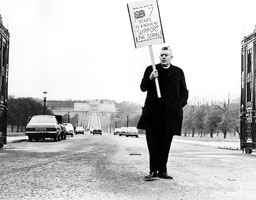10 January 2008 Edition
State Papers : 1977 Paisley prominent as usual

Ian Paisley features prominently in recently released British state papers for 1977
Unionists fail to back re-run of 1974 strike
As with most years of the conflict the name of Ian Paisley features prominently in recently released British state papers for 1977. The leader of the DUP attempted a re-run of the 1974 UWC strike when unionists opposed to the 1974 Sunningdale Agreement brought the Six Counties to a standstill. However the 1977 Paisley lead strike was largely unsuccessful.
Under the umbrella of the United Unionist Action Council Paisley demanded a return to unionist rule at Stormont and for harsher ‘security’ measures, but unlike 1974 unionists didn’t support the action across the board.
Senior Ulster Unionists and high ranking Orange Order figures spoke out against the stoppage, the British government moved against the strikers and the strike which began on 2 May had ground to a halt by 13 May.
Paisley also became involved in a dispute along the Springfield Road in West Belfast. According to cabinet papers a Mr E Cadden wrote in a disparaging way that Paisley went to the aid of Protestants living in the Dunboyne area of the Springfield Road after what he Cadden termed, “squabbles”, with Catholics.
According to Cadden these Protestants had been evacuated from the New Barnsley estate in a, “Paisley orchestrated exodus”, in 1970.
“Dr Paisley has galloped to the aid of the besieged community but was rather slower than official action”, sneered Cadden.
The killing of two prominent businessmen by the IRA in early 1977 rocked British government’s strategies aimed at convincing international opinion, particularly United States investors, that they had stabilised the political conflict in the North. In the aftermath of the killing of Jeffrey Agate, head of the American Du Pont operation in Derry, the British government’s efforts to attract US investment in the North was undermined.
According to secret British government cabinet papers, released under the 30 year rule, the issue of the assassination of the English born Agate on 2 February 1977 and the shooting of Yorkshire PR executive James Nicholson a month later, “became acute”, during an investment tour of the US by the then NIO economy minister Don Concannon.
In a statement the IRA outlined it’s strategy of targeting leading business people saying they, “attempted to stabilise the North’s economy to serve British interests”.
Acknowledging the damage that this latest IRA strategy was doing to the British government’s own normalisation and Ulsterisation strategies an NIO official RC Masefield wrote to the then Secretary of State Roy Mason to suggest that Concannon should extend his investment tour of the United States.
He wrote, “in view of the death of Mr Agate and the publicised campaign by the IRA against businessmen in Northern Ireland that Mr Concannon will be advised to visit certain other companies”. The idea was to reassure both potential and existing American investors.
Other secret papers released under the 30 year rule revealed that a Catholic church delegation met with the NIO’s Education Minister Lord Melchett over the latter’s proposals for educational reform.
Bishop Edward Daly and Monsignor Robert Coulter President of St Columb’s College in Derry lead the delegation. The clerics voiced their strong opposition to Melchett’s plan to reorganise secondary level education provision along comprehensive lines and defended the Catholic grammar school system.
Melchett also supported moves towards a more fully integrated education system however these proposals also met with opposition from the Catholic clerics.


